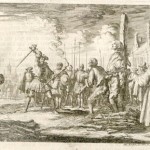Equipped by Itinerant Servants of God
One of my favorite passages of Scripture is Ephesians 4:7-16. After focusing on our unity in Christ in Ephesians 4:1-6, Paul turns to the great diversity among the body of Christ – all worked out by the Holy Spirit according to the grace of God.
But, as he comes to the end of that passage (Ephesians 4:16), Paul stresses that the diversity is not simply a demonstration of the myriad grace of God, it is also through all of the different (diverse) parts of the body of Christ that the Spirit works to build us all up – when we are all working together as God directs us and provides for us.
In Ephesians 4:11, Paul focuses on a few of the ways that God works through his children: as apostles, prophets, evangelists, and pastors and teachers. These people who have been gifted by the Holy Spirit and given by Jesus Christ equip the church for works of service. The evangelist, then, proclaims the gospel of Jesus Christ, but also equips other believers to do the work of service of proclaiming the gospel, even those who are not gifted as evangelists. Those gifted at teaching and shepherding not only teach and shepherd others, they also equip other believers to do the work of service of teaching and shepherding as well.
But, what about the apostle? How does the apostle equip the church? Usually, I’ve heard it suggested that apostles equip the body of Christ by proclaiming the gospel, revealing the word of God, and teaching and shepherding. But, these are actually including in the work of the evangelist, the prophet, and the teacher and shepherd. What is distinctive enough about those gifted as apostles that would cause Paul to list them separately?
There is one distinction of those gifted as apostles: they are specifically gifted to travel from place to place serving God. In other words, while they may do many other things, the gifting of apostle is primarily to do the work of the itinerant servant.
So, how does the apostle – the itinerant servant of God – given to the body of Christ by Jesus to equip the church – actually equip the church as Paul instructs in Ephesians 4:12-13? What is the work of service that the apostles equip others to do?
Just as the evangelist equips others to evangelize, and the teacher equips others to teach, the itinerant servant (apostle) equips others to travel from place to place just as the itinerant servant does. I think we see a beautiful picture of how this kind of equipping (to be itinerant servants) worked itself out in the life of some believers in this passage:
And you became imitators of us and of the Lord, for you received the word in much affliction, with the joy of the Holy Spirit, so that you became an example to all the believers in Macedonia and in Achaia. For not only has the word of the Lord sounded forth from you in Macedonia and Achaia, but your faith in God has gone forth everywhere, so that we need not say anything. (1 Thessalonians 1:6-8 ESV)
While the believers in Thessalonica (a city where Paul only stayed a few weeks) did not travel as far and as wide and as often as Paul and others gifted as apostles, they did travel enough to proclaim the word of God around their region and into neighboring regions. Paul – gifted as an apostle to travel from place to place as an itinerant servant of God – had equipped them (even in a short period of time) such that they were also traveling from place to place to proclaim the word of God.
How could you see itinerant servants working today to equip the body of Christ? What are some ways that others (not gifted as itinerant servants) could serve when equipped by itinerant servants?
————————–
Addendum: Yesterday, on Facebook and Twitter, I linked to an older post that I wrote about itinerant servants. Several new comments were pertinent to this post, so I thought I would include a couple of excerpts here:
Eric writes: What I should have said is, “I would call those people ‘Christians’ or ‘Christ Followers.’ In one way or another I think it is what we’re all called to do and by making a distinction dismisses it to the role of a few.
Mark writes: Eric suggests that Christians should be itinerant in general, and I absolutely agree, but I hesitate to make that an absolute. I’m guessing there are many Christians around the world who never leave their village/town, and certainly the duration that someone feels led to stay/go will vary widely. But I think Eric brings up a great point that in general, Christians should be less tied to some tangible thing (house/job/preference) and be more tied to the leading of the Spirit, wherever and to whomever that might lead.
Greg writes: Looking over 2 millenia of the church, we also have a really messy macro trajectory, with very little scripture to back up anything we have done or built. And yet, histories pages are filled with the love and leading of Gods people, and His blessing on all of us.
And today, I’m genuinely jealous of my children who I suspect are going to see the glory of God like few generations in history.
Itinerant indeed!
God is really among you
If you’ve followed my blog for even a short time, you probably know that Eric at “A Pilgrim’s Progress” is a good friend of mine. We’ve known each other for almost 10 years and have spent time with one another’s family – although not enough in the last few years because we live in different states (and different countries for a while).
Like me, Eric’s understanding of the church has changed since we’ve known each other, even though we’ve taken different paths along the way. One thing that we’re both convinced of (currently) is the benefit of conversation and discussion among the church. His latest post, “Awe in the Conversation,” touches on one aspect of the idea of teaching one another through discussion.
Here’s one snippet from his post:
I love hearing from multiple people about how they have seen God act during the previous week. Usually it is in the little things. Occasionally, it is the bigger stuff. Either way, my faith is strengthened through it. My hope is that others are encouraged as I speak. Sometimes we all just sit in silence after someone has spoken of what God has done and is doing.
This sort of gathering finds awe in the conversation. Someone might speak about a passage of scripture from an angle that I have never even considered before. When a light bulb comes on in my brain, the response is usually awe of God and thanks to Him. Someone else might speak about being stuck in a situation where there seems to be no way out (whether it be big, small, or somewhere in between), only to then find God delivering them from it.
As we gather, I’m usually sitting on the floor or on a couch. Literally, then, I’m sitting. Emotionally and spiritually, however, I’m standing. I’m standing in awe of God because of what I’ve heard in the conversation.
When I read Eric’s post, I couldn’t help but think of what Paul wrote in 1 Corinthians 14:
If, therefore, the whole church comes together and all speak in tongues, and outsiders or unbelievers enter, will they not say that you are out of your minds? But if all prophesy, and an unbeliever or outsider enters, he is convicted by all, he is called to account by all, the secrets of his heart are disclosed, and so, falling on his face, he will worship God and declare that God is really among you. (1 Corinthians 14:23-25 ESV)
Obviously, in that passage, Paul is comparing the benefit of tongues speaking (which people cannot understand) to the benefit of prophecy (which people can understand). But, his last point is important: The unbeliever recognizes that God is among them because he hears from God through different people.
Oh, yes. There is definitely “awe in the conversation” when our hearts are focused on God together and we seek to build one another up together.
From the Anabaptists: Schlaffer on love and sacrifice
Last week, I enjoyed reading an article about Anabaptists and writing about that article in my post “Which Distinctive Practices and Beliefs of Anabaptists are Important for the Church Today?” Reading that article, writing the post, and following the discussion in the comments reminded me of a great book that I read online last year called “The Secret of the Strength.” One of the things that I love about that book is that the author (Peter Hoover) includes many, many quotations from the Anabaptists themselves.
For the next few days, I’m going to post a few of those quotations. You may not agree with everything they wrote, but hopefully they will help us thinking about our new life in Jesus Christ.
This quotation was written by Hans Schlaffer just before he was beheaded in 1528:
The body of Christ on the earth is the Gemeinschaft (community) of those who believe on him. Whoever eats the bread of the nighttime meal expresses with that his desire to live in Gemeinschaft with this body and to be a part of it in all things—to stick with the Gemeinschaft though joy and sorrow, riches and poverty, honour and shame, mourning and rejoicing, death and life. He expresses his desire to give everything he has, both body and life for his brothers even as Christ gave himself for us.
When I read this short quote, I can’t help but notice the connection: Christ to the body of Christ and the body of Christ to one another. It’s a seamless connection to Schlaffer. Even sharing the nighttime meal (“communion” for the Anabaptists) is much more than sharing food. It is a recognition of their relationship to one another through Christ.
And, because their relationship to one another was based on their relationship to Christ, they were committed to one another. I’m not talking about committed to meeting together once a week, or committed to some program or leadership structure. They gave their lives – physically and spiritually – for one another.
Consider Schlaffer’s description: “to stick with the community though joy and sorrow, riches and poverty, honour and shame, mourning and rejoicing, death and life.” Does it sound familiar? Does it sound like the promises that a husband makes to a wife?
You see, even today we recognize the spiritual commitment between a husband and a wife. But, do we recognize that Scripture describes the same kind of spiritual commitment between brothers and sisters in Christ?
We recognize the destruction that happens when a husband and wife relationship is severed. But, do we recognize that – in reality – similar damage happens when any relationship between brothers and sisters in Christ is severed.
When we recognize the importance of unity and fellowship among brothers and sisters in Christ, we will also begin to understand what it means to commit ourselves to one another in Jesus Christ.
Why was this type of commitment present among the Anabaptists? Because they were willing to sacrifice themselves for the sake of others. They cared more about others than they cared about themselves.
A Panic Attack Leads to Sharing the Gospel… by the one having the panic attack
A friend of ours had to to go to the dentist. While in the chair, she started having a panic attack. One of the things that she did in response was to send a text to her husband.
Her husband sent a text to several people telling them what was going on.
One of the woman’s friends got the text and went to the dentist’s office. She told the receptionist what happened, and eventually was led into the room with the woman had been having a panic attack.
By the time the friend arrive, God had calmed the woman down, and she was no longer having a panic attack. However, the friend stayed with her a few minutes to comfort her and encourage her.
When the friend left, the dental hygienist asked about the visit. This gave the woman an opportunity to explain about her relationship with her friend which led to a proclamation of the good news of Jesus Christ.
Because of a panic attack… It’s so awesome to see God work through (and in spite of) the brokenness in our lives when we submit it to him.
From the Anabaptists: Simons on love and community
Last week, I enjoyed reading an article about Anabaptists and writing about that article in my post “Which Distinctive Practices and Beliefs of Anabaptists are Important for the Church Today?” Reading that article, writing the post, and following the discussion in the comments reminded me of a great book that I read online last year called “The Secret of the Strength.” One of the things that I love about that book is that the author (Peter Hoover) includes many, many quotations from the Anabaptists themselves.
For the next few days, I’m going to post a few of those quotations. You may not agree with everything they wrote, but hopefully they will help us thinking about our new life in Jesus Christ.
This quotation was written by Menno Simons in 1551:
We teach that all Christians are one body (1 Cor. 12:13). All partake of one bread (1 Cor. 10:18). All have one God (Eph. 4:5- 6). It is only reasonable that Christians care one for another. The entire Scriptures speak of mercy and love, the sign by which true Christians are known. “By this shall all men know that you are my disciples, if you love one another” (John 13:15).
It is not normal for a person to care for one part of his body and leave the rest uncared for and naked. No. The intelligent person cares for all his members. It is this way in the Lord’s church as well. All who are born of God and called into one body are prepared to serve their neighbours, not only with money and goods, but like Christ did, with life and blood. They show mercy as much as they can. No one among them is allowed to beg. They take strangers into their homes. They comfort the afflicted, clothe the naked, feed the hungry, and do not turn their faces from the poor.
For the Anabaptists, everyone who was in Christ was also part of the kingdom of God and the community (Gemeinschaft) of believers, i.e. they were part of the church. And, the church cared for one another just as a human takes care of his entire body.
The important part of Simon’s quote is who he considered to be part of this “body” with him. Notice he begins with this: “all Christians are one body.” He does not distinguish. If he considers someone a Christian, then he also considers that person to be part of the church along with him. He is willing to lay down money, possessions, life, and blood for that person.
Not only is this service offered to all who are in Christ, it is also the work of all who are in Christ. He wrote, “All who are born of God and called into one body are prepared to serve their neighbours.” All. This is mutual service (ministry). Everyone is ready to serve whoever is in need of service. There is no sectarianism or divisions.
Today, if Christians care for and serve one another, they tend to do so within the boundaries of local church organizations. I do not think this is the kind of service that we see in the New Testament, and it’s not the kind of service that the Anabaptists displayed either.
A well-rounded look at the “one anothers”
A couple of weeks ago, in my post “The who, what, where, when, and why of the One Anothers,” I pointed out that Jon from “Jon’s Journey” was writing a series about the “one another” passages in Scripture.
In his introductory post, he explained that he was planning to cover the 5 “W” questions related to these instructions: what, who, where, when, and why. He even added a 6th post for the question, “How?”
Jon has now completed his series on the “one anothers.” I think this is a great series, so I’m adding links to each of the posts here:
Part 1: Five W’s of One Another – intro and verses showing what the one anothers are
Part 2: Who One Another
Part 3: Where One Another
Part 4: When One Another
Part 5: Why One Another
Part 6: How One Another
I’ll just add one more snippet for Jon’s post on “when”:
Do we think most of these actions should take place at a special time or scheduled event?
We know some believers did meet regularly together. Some daily and some on certain days of the week. But I believe these verses were not only related to regularly scheduled gatherings.
I think it is safe to say they took place whenever the believers interacted with each other.
Can you imagine the “one anothers” taking place any time believers are together with one another – whether it’s just two or if it’s more? Even on Sunday morning when the whole church gathers together (as is traditional today)?
Yep. I can imagine it.
You know what I can’t imagine? I can’t imagine that the authors of Scripture intended for their “one another” instructions to to apply at all times EXCEPT when the church gathers together.
How are you? Fine, and you? Fine.
Bobby at “Deconstructing Neverland” has written a very good post called “You Don’t Know Jack.” The point of his post is that we often recognize (through the indwelling of the Holy Spirit) our need for relationships with others, especially others who are in Christ. However, in a desire to create those relationships, we often end up with something much less.
In fact, often when we create things to “build community,” we build a semblance of community that simply hides our lack of real community in Christ.
For example, Bobby writes:
That is precisely the dilemma one faces as they venture out in search for community in church life. Anyone who has Christ in them has this intrinsic desire for deep fellowship and community with other believers. It’s evident by the programs and meetings we plan and put together. There are community groups built around all sorts of interests and needs. People get together for bible studies, accountability, addiction recovery, marital status, and many other commonalities. I’ve been a part of each of these types of groups. The problem is that these groups do not form lasting communities, at least not in my experience…
We don’t know how to be transparent and honest with one another. What we know is what we’ve been trained for. We know how to hide our struggles and put on a happy face. We like our shallow conversations.
Shallow conversations are comfortable and safe. They can make us feel good about ourselves and others. We can pat each other on the back and call ourselves “community.”
But, when it comes down to it, we all recognize the difference. (And, by the way, those outside the church recognize the shallow relationships among Christians also.)
Community – even shared lives in Jesus Christ – takes time. It takes time because we must move beyond the shallow conversations: “How are you?” “Fine. And you?” “Fine.” We must be willing to ask each other difficult questions and share the “trash” (as Bobby calls it) from our own lives. And this is extremely important – we MUST offer each other the same grace that God has offered us in Jesus Christ.
Read Bobby’s post and then consider the question that he asked: “What are you going to do about it?”
To be mutually encouraged among you by each other’s faith
The title of this post is my translation of the first part of Romans 1:12, which the ESV translates, “…[T]hat we may be mutually encouraged by each other’s faith…” [I’m not sure why they decided to leave out the prepositional phrase “among/in you (plural).”]
I was reminded of this verse – part of Paul’s letter to the Christians in Rome – when I read a post by Eric at “A Pilgrim’s Progress” called “Willing to be One Anothered.” In this short post, Eric exhorts us toward mutual service (that service to and from one another).
I’m not going to quote much of his post, because it is fairly short. (So, make sure you jump over to his site and read the whole post.) Here is a short excerpt:
In talking about the one anothers, most of the focus usually falls on what we should do for others. I suppose this makes sense. However, we also need to realize that we must allow others to do for us. The one anothering is a two way street…
There is a sort of reciprocal nature to all this. We all grow up together in Christ as we serve one another. We help others grow by one anothering together. This involves both giving and receiving. If we only focus on the giving, we end up inadvertently hurting both ourselves and others.
I can’t speak to other parts of the world, but I know in this area being helped by others is frowned upon. But, among the church, we must be willing to both serve others and to be served by others. Christ matures his church as we work together to help one another.
Sometimes it’s harder for me to receive from others than to give to others. But, like Eric says, both are necessary parts of God growing and maturing his people.
Would you be willing to share a time when God worked through one of his children to “give” to you?
How far does your heart extend?
We all know that God gifts his children differently through the presence and power of his Holy Spirit. We also know that God gives us all different opportunities to increase his kingdom. But, lately, I’ve had a few conversations that have stretched my thinking in other ways as well.
For one thing, several people have commented about or asked something like this: “How far does your heart extend?”
Now, I should define what this questions means, as I’ve come to understand it. And, it helps me to start with what the question doesn’t mean. For one thing, the question is not asking whether or not you love God or others. In fact, for this question, loving God and loving others is assumed. Second, the question does not assume that the farther your heart extends the more you love God or others.
Instead, this question is asking something different: To whom is God directing your love, passions, and concerns? Like with the question of spiritual gifts or opportunities to serve, no answer is better or worse than other answers. However, thinking through this question can help us understand how God wants to use us.
For example, God has given some people a very strong passion and love and concern for the people immediately around them – the people that they see every day. They are content in their spirit serving the people who live near them.
For other people, God has given them a very strong passion and love and concern for people around the world. They are content when they are serving people in a variety of locations.
Finally, I think God gives all of us strong passions and loves and concerns for people somewhere along this spectrum, from the people near us to people across the globe. Again, neither end of the spectrum is better than the other. And, having passions, loves, and concerns at one end of the spectrum does not mean that we should not display love toward others (either near or far).
Instead, if we can honestly answer the question, “How far does your heart extend?” then we may be able to better understand which direction God is leading us. Is he leading us to primarily pour our lives into the people in a certain location, or is he leading us to primarily pour our lives into people in different locations?
Also, answering this question can also help us grow in the other direction. For example, if God has extended our hearts to people around the world, we need to constantly check our attitude and service toward those near us. And, if God has extended our hearts to people nearby, we need to constantly check our love and concern for those around the world.
Finally, asking and answering this question can help us check our attitudes toward people whom God is using in a different way. If we pour our lives into people nearby, do we think less of those who have loves and concerns spread around the world (and, thus, not as “dedicated” to people near us)? Or, if we have passions for people spread around the globe, do we think less of those who spend so much time loving and caring for physical neighbors (instead of shifting their concerns toward “the nations”)?
But, in general, asking and answering that question can help us determine how and where God may be using us: How far does your heart extend?
So, I’ll ask you: How far does your heart extend?
Mutuality: Sharing Life in Christ Together
For the last few days, I’ve published a short series connecting mutuality and various forms of service for the same of the gospel: 1) itinerant (apostle) service, 2) teaching service, and 3) shepherding service. In each case, I stepped through the life of Jesus in the Gospels and the life of his followers in Acts and the various letters of the New Testament to show that these types of service were the work of all believers, not just the work of one or a few.
Now, I could have focused on any type of service. However, I picked these three because among the church people usually assume that only certain people carry out the work of itinerant service, teaching service, or shepherding service. Relegating these types of services to only one or few damages the health of the church.
Before I go much further, I want to point out that I DO believe that only some people are gifted as apostles (itinerant servants), or as shepherds, or as teachers, in the same way that only some people are gifted as encourages, or contributors, or helpers. However, just as all believers can encourage, give, or help, all believers can also serve in an itinerant fashion, or by shepherding, or by teaching. In fact, those gifted in certain ways should help all believers learn how to serve in that way. That is “equipping.”
This idea of mutual service (ministry) is carried over into the many, many “one another” passages of Scripture – some of those passages even include the same types of service as I’ve talked about here (i.e., “teaching one another”). The “one another” passages of Scripture point to a fellowship that we have with one another in the Holy Spirit. This fellowship is a sharing of life – sharing our life in Christ as we share our lives with one another.
In this kind of fellowship, “one way” service is out-of-place. Why? Because the service itself does not arise from within ourself but from the life of the Spirit within us. And, the Spirit is not ONLY in me. The Spirit is in each of us. The Spirit that gifts me and empowers me to serve in various manners is the same Spirit that gifts and empowers others to serve in various manners.
It is the Spirit in me that “qualifies” me to serve. (“Qualify” is the wrong word; but you understand what I mean.) But, in the same way, the Spirit “qualifies” others to serve as well. If I refuse to serve others as God directs me through his Spirit, then I am hindering the work of the Spirit. In the same way, if I refuse to accept the service of others as God directs them through his Spirit, then I am also hindering the work of the Spirit.
Just as Christ is my life, he is also our life together. As we share in Christ’s life, we also share in life together by the Holy Spirit. This same Spirit gifts us and empowers us and works through us to serve one another. This is the mutual life that we share in Christ together.
————————————–










